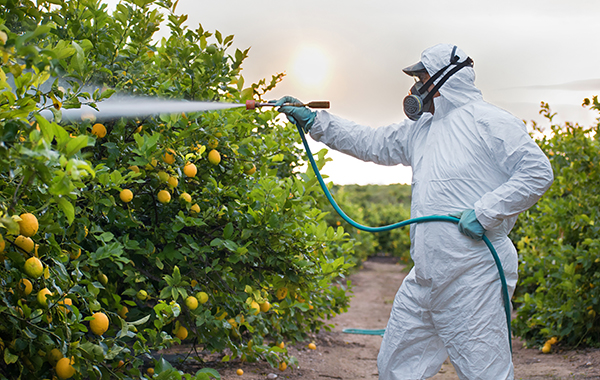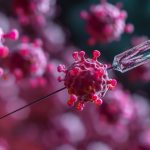
Report shows pesticide drift is wreaking havoc on ecosystems everywhere in the world
Monday, January 20, 2025 by Ava Grace
http://www.naturalnewsresearch.com/2025-01-20-pesticide-drift-wreaking-havoc-on-ecosystems-everywhere.html

- Airborne movement of pesticides is harming ecosystems worldwide, disrupting food webs and harming non-target species, as highlighted in a recent review published in Environmental Pollution.
- Up to 25 percent of sprayed pesticides become airborne, traveling long distances and contaminating plants, soil, and water, harming beneficial insects, birds, and microorganisms.
- Pesticides disrupt soil microbial communities, reducing fertility and crop health, while also polluting streams and aquatic ecosystems, as seen in California.
- Pesticides have been detected in remote areas, such as parts of Brazil, demonstrating their ability to travel vast distances and affect even pristine environments.
- Current risk assessments fail to address long-term impacts, and harmful pesticides like dicamba remain in use despite evidence of environmental and health risks, highlighting the need for stricter, proactive regulation.
Pesticides, long hailed as a cornerstone of modern agriculture, are now being exposed as a significant threat to biodiversity. A recent review published in Environmental Pollution reveals that pesticide drift – the airborne movement of these chemicals – is wreaking havoc on ecosystems across the globe.
From North and South America to Europe and Asia, researchers from Germany, Norway, the United Kingdom and Poland have sounded the alarm: Pesticides are not just killing pests; they are disrupting entire food webs, harming non-target species and destabilizing the very ecosystems that sustain life. (Related: Study: Pesticide exposure linked to obesity, endocrine disorders and other devastating health effects.)
The science is clear. When pesticides are sprayed, up to 25 percent of the chemicals can become airborne, traveling hundreds or even thousands of kilometers from their intended target. This drift doesn’t just vanish into thin air – it settles on plants, water and soil, poisoning beneficial insects, birds and other wildlife.
Biodiversity is the foundation of ecological stability and food security
The problem extends far beyond individual species. Pesticide drift disrupts entire ecosystems by altering the balance between predators and prey, reducing plant diversity and destabilizing soil health.
Microorganisms are particularly vulnerable. When pesticides contaminate soil, they disrupt microbial communities, leading to reduced biomass, growth disturbances and even respiratory problems for these tiny but vital organisms. The consequences are dire: less fertile soil, weaker crops and a more fragile agricultural system.
Even water systems are not spared. Studies in California have found that pesticide drift has polluted more than 10 percent of streams in certain regions, threatening aquatic life and the communities that depend on these water sources.
The global reach of this issue is staggering. Pesticides have been detected in remote areas of Brazil, far from any agricultural activity, proving that these chemicals can travel vast distances and contaminate even the most pristine environments.
Despite the mounting evidence, regulatory bodies like the Environmental Protection Agency have been slow to act. Current risk assessments fail to account for the long-term, cumulative impacts of pesticide drift on ecosystems and biodiversity.
Pesticides are often approved based on limited safety data, only to be restricted or banned years later when the damage becomes undeniable. This reactive approach is not only inadequate but dangerous. The continued use of harmful pesticides like dicamba, despite evidence of their environmental and health risks, underscores the need for a paradigm shift in how these chemicals are regulated.
Visit Pesticides.news for more stories about the dangers of pesticides.
Watch this short video discussing how to wash off pesticides from food.
This video is from the channel The 100% Clean Food Lifestyle on Brighteon.com.
More related stories:
Study: 22 Chemicals used to grow FOOD linked to higher risk of PROSTATE CANCER.
Sources include:
Tagged Under: Tags: agriculture, Air pollution, badpollution, badscience, biodiversity, conservation, dangerous, Ecology, environment, herbicides, pesticide drift, pesticides, poison, research, toxic, toxic chemicals, toxins, truth, weed killer, wildlife
RECENT ARTICLES


Bioweapons researcher from Wuhan Institute of Virology comes forward with startling revelations

Exposed: How U.S. tax dollars funded bioweapons research and COVID-19’s origins
By Willow Tohi

Underwater volcano off the coast of Oregon likely to erupt THIS YEAR, according to researchers
By Willow Tohi

Study warns microplastics can infiltrate the brain and raise the risk of cognitive problems
By Ava Grace
COPYRIGHT © 2017 NATURAL NEWS RESEARCH


